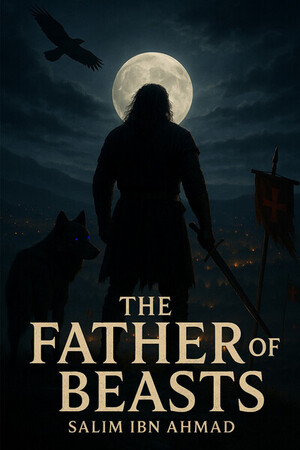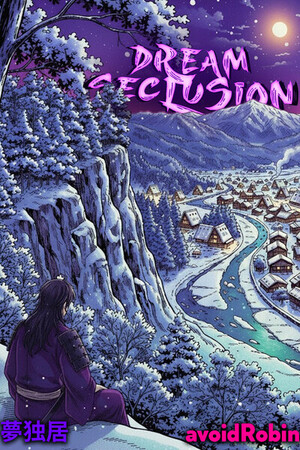Chapter 1:
Chapter 1 — The Siege Tower
The Father of Beasts
The city had run out of bread before it ran out of breath.
For two weeks Ma’arra had held. By day, smoke ringed the sky. By night, the clouds glowed red. They were not soldiers on the walls—just farmers with rope burns across their palms, masons with lime under their nails, boys clutching slings, old men who had once hunted boar in the hills.
And among them stood the one everyone watched from the corner of their eyes: Ahmad, the town’s Abu al-Wuhush (Father of Beasts).
He looked carved out of the hills themselves. Long black hair hung loose around a heavy beard. Scars lined his forearms. His shoulders were broad, his step steady, every movement deliberate. When he lifted his bow, the noise along the parapet thinned to silence.
A wolf stayed at his heel — Nahhas, blue-eyed, scar-muzzled, black coat, raised from a pup torn orphan in the hills and hasn’t left his side since. Above, the hawk Reeh circled, once a starving fledgling he nursed back to health, now his shadow in the sky. In the gate-tower, Adham hammered iron hooves, his father’s black stallion and his only inheritance, scarred but unbroken. His family.
Across the plain, the siege tower rolled closer. Raw timbers bound with iron, hides soaked in water to drink fire. It loomed taller than the wall by a man’s height. Oxen strained at the yokes in its shadow. Ropes stretched tight as men dragged, chanting low and steady. Mantlets crawled with it like beetles, shields of thick planks inching toward the ditch. Behind the hides were iron-capped men in white, red crosses chalked across their tunics.
Beyond the tower, banners marked who had brought this storm. Ahmad did not know their words, but he knew the gesture when a hand lifted and men moved forward to kill.
“Why us?” a woman asked, clutching a wrapped infant. “We are farmers. We have no coin.”
Another man spat dark phlegm. “They promised mercy if we opened the gates. Lies. The Franks keep no oaths.”
A boy with a sling muttered, “There is no army here.”
Ahmad gave no answer. He simply drew and loosed.
His first arrow caught a torch-bearer at a range most men guessed at. Fire and man dropped together. His second shaft punched through a mantlet plank and dropped the soldier hiding behind. A third arrow flew through the narrow V where two boards met, buried in a throat. A helmet lifted above a shield for a look; Ahmad put an arrow straight through the visor hinge.
Four arrows. Four bodies. The murmuring on the wall stopped cold.
“Wall!” someone shouted. Stones and arrows rained down, clattering harmlessly against wet hides. Ahmad saved his shafts. He slowed his breathing, fingers smoothing the yew as if calming a horse. Above him, Reeh screeched. Nahhas pressed against Ahmad’s leg, silent, scar muzzle twitching.
“Keep your tongues steady,” the mason barked, but his eyes still flicked toward Ahmad, looking for strength.
The tower crept another cart-length forward. Water still seeped from its hides. At its base, teams strained, curses rising. Men shoved mattocks under wheels stuck in the churned mud. Beyond them, iron glinted like a field of stars. The ram pounded at the lower gate, dull and heavy, stone groaning with each strike.
“Allah (God) have mercy,” the woman with the child whispered. “Why do they come with prayers on their mouths and iron in their hands?”
Ahmad listened to the chant rolling from the plain, harsh and guttural. He didn’t know the tongue, but he remembered the sounds.
“They come because they think the world is theirs,” the mason answered.
Ahmad searched for the one the others followed—the baton-holder, the heartbeat of the push. At this distance, most men would waste arrows. Ahmad breathed out slow, let the wind tell his fingers what to do, and loosed.
The baton fell. The ropes lost rhythm. For a dozen heartbeats the tower faltered.
On the wall, men whispered thanks under their breath.
Others fired at whatever they could see, arrows clattering off hides. Ahmad picked only the openings: a calf behind a shield, a throat stretched in a yell, a hand too long on a torch. His arrows cut work, not air.
“No one shoots like him,” the mason muttered.
A sling-stone sparked against the merlon by Ahmad’s head. Nahhas didn’t flinch. The wolf leaned harder into him, steady as stone. A few braver men touched the animal’s back for luck, then pulled away quickly.
Down the line, boys flung pebbles. Men dragged up jars of water, the last scraps of pitch. A crooked chain of hands passed stones up to the crenels. The air filled with ash, burned hide, sweat.
“Their songs,” the woman said, her face pale. “They sing like they pray.”
“They do,” the mason told her. “Pray to win, same as us.”
“And if we don’t?”
“Then we bury our dead and remember.”
Ahmad loosed again, cutting down a crossbowman who thought himself hidden. The enemy’s weapon kicked skyward as its owner fell. A cheer rose thinly. Ahmad didn’t look up—his quiver was light. His fingers found each shaft by feel, knowing its balance, its weight, like bones of his own.
“Father of Beasts,” whispered one sling-boy, awe mixed with fear. “They say you fought a lion and came back laughing. Is it true?”
Ahmad’s next arrow cracked into a shield-rim, snapping the hand behind it. “I fought what came up the path to eat goats.”
“And you won?”
“Once,” he said, loosing again.
The ram thudded. The tower crawled. The ditch between filled with wreckage. Breath steamed in the chill, then caught and froze. Reeh wheeled higher, her shadow brushing the tower’s skin.
“Why don’t they leave us be?” the woman asked.
“They want the road south,” the mason said. “And pride to say they took it.”
A voice farther down the line cried out: “They knew! Someone led them here!”
Another spat: “Curse the ones who sold us out.”
Ahmad heard it. Even above the ram, even above the chants. He locked it in his chest like an arrow waiting on the string. There were always traitors.
His last shaft punched a torch from a hand that thought itself safe. He slung his bow and drew a short spear. The men beside him mirrored him without thinking: arrows while you had them, iron when you didn’t.
Nahhas’s hackles rose stiff. Ahmad touched the wolf’s neck once. The fur was soot-black under his hand. Nothing more needed saying.
Reeh shrieked, rising higher. Behind them, Adham’s hooves thundered against stone.
The tower came on. Its wheels found rhythm again. Ropes thrummed. Ladders rose, pawing the sky. Chants thickened. Wet hides quivered under arrow strikes, shedding them like rain.
“God will open a door,” the mason muttered—he’d said it every day.
“Until He does,” Ahmad rasped through smoke, “we hold.”
He planted his feet. Men to his left and right followed suit. Hands tightened on spear-shafts, on stones. Below, the gate groaned.
The tower’s shadow swallowed them.
“Ready!” someone cried. It might have been Ahmad. It might have been anyone.
The siege tower loomed until it filled the world—wet hide, iron pins, the breath of men who had marched across the earth to kill. A ladder clawed at the stone. The chant from the plain sharpened like teeth.
The tower lurched its final step, more fall than stride.
It had not yet kissed the parapet, but everyone knew it would in the next breath.
DISCLAIMER
This book is built upon real history. It follows the
chronicles of the First Crusade; only its characters are
imagined. It seeks to honour truth, not senseless violence.
I was unaware of the history of the First Crusade before
I started imagining a story set during this time, once
I learned it, I was compelled to write about it. Every city,
march, atrocity and siege is drawn from the chronicles of
Muslim and Frankish writers of the Crusades, these were
not inventions. The massacres and rivers of blood were
real.
Ahmad — the so-called Father of Beasts— is fiction.
His beasts, his Brotherhood — imagined. But the struggle
he embodies is not, he is based off of a combination of
Muslim historical figures and narrations. His life is a lens,
a realistic way to walk the roads of the Holy Land (Bilad
al-Sham) in 1098–1099 and see events as they unfolded.
He stands for those whose names were never written,
though they bore the weight of history.
The purpose of this work is not to change history, but
to remember it through the eyes of one man who could
have existed there — to walk beside him, and not to forget




Please sign in to leave a comment.